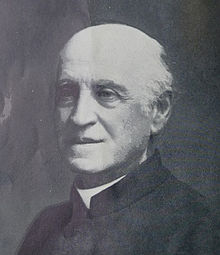Matthew Russell (priest)

Matthew Russell SJ (1834–1912) was an Irish Jesuit, known as a writer, poet and editor.[1]
Life
He was born at Ballybot,
Ordained priest in 1864, Russell then taught at Crescent College, outside Limerick, to 1873.[1][2] From 1873 he was in Dublin, from 1877 a priest at Saint Francis Xavier Church.[1]
The Irish Monthly
A memoir of Russell by
Declan O'Keeffe considers that the contributions received dictated a change in editorial policy away from the devotional.[11] The change of title to Irish Monthly has been attributed to persuasion from friends and supporters, who included Lady Monteagle, daughter of the Protestant bishop Samuel Butcher.[7] It occurred in 1875.[12]
From 1875 Russell had some editorial assistance given by
Irish Literary Revival
William Delany, a friend of Russell's, noted the work he did in bringing young writers to notice. Katharine Tynan considered he provided a unique literary focal point in Dublin.[16]
Works
- Emmanuel: a book of eucharistic verses (1878)[2]
- The Idylls of Killowen: a Soggorth's Secular Verses (1898)
Notes
- ^ doi:10.1093/ref:odnb/62930. (Subscription or UK public library membershiprequired.)
- ^ ISBN 978-0-7201-2318-0.
- ^ "Russell, Matthew, Dictionary of Irish Biography". www.dib.ie.
- ^ doi:10.1093/ref:odnb/52697. (Subscription or UK public library membershiprequired.)
- ISBN 978-1-85182-827-2.
- JSTOR 20505687.
- ^ JSTOR 20505687.
- JSTOR 25746115.
- JSTOR 20501476.
- JSTOR 25746115.
- JSTOR 25746115.
- ^ s:The Catholic Encyclopedia and its makers/Russell, Reverend Matthew
- doi:10.1093/ref:odnb/20820. (Subscription or UK public library membershiprequired.)
- ISBN 9780198661580.
- ^ "[Fr.] Thomas A. Finlay". www.ricorso.net.
- JSTOR 25746115.
